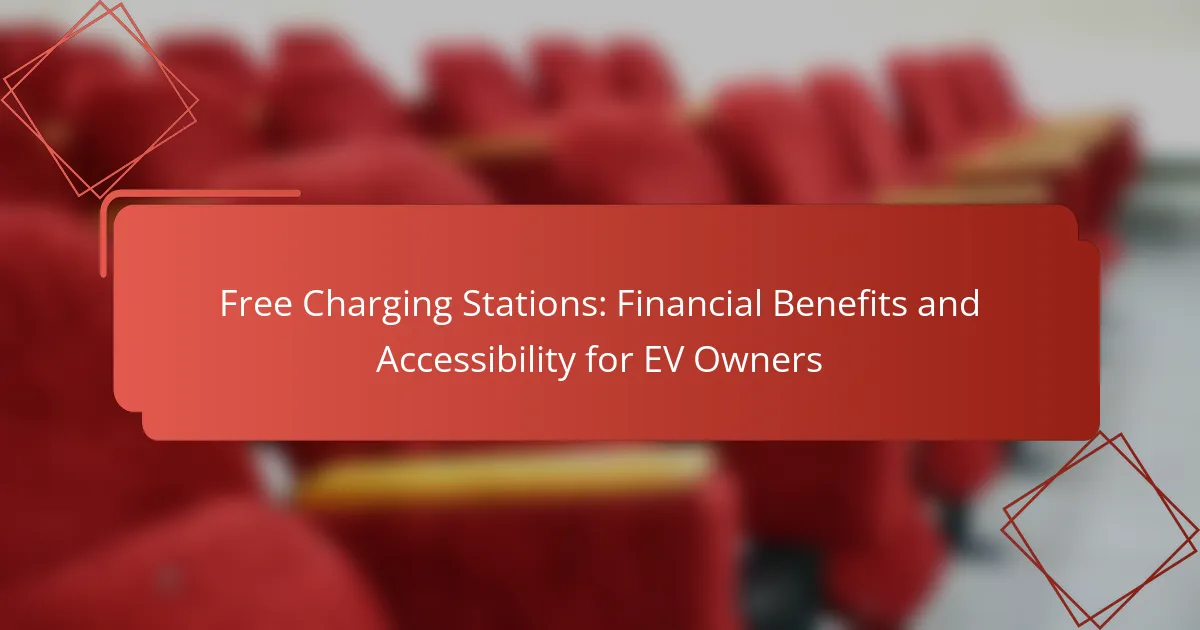Free charging stations offer electric vehicle (EV) owners a valuable opportunity to save on costs while enhancing the convenience of recharging their vehicles. Available in numerous public and commercial locations, these stations not only make EV ownership more accessible but also encourage the widespread adoption of electric vehicles. By understanding the different types of free charging stations, EV owners can select the best options to meet their charging needs.
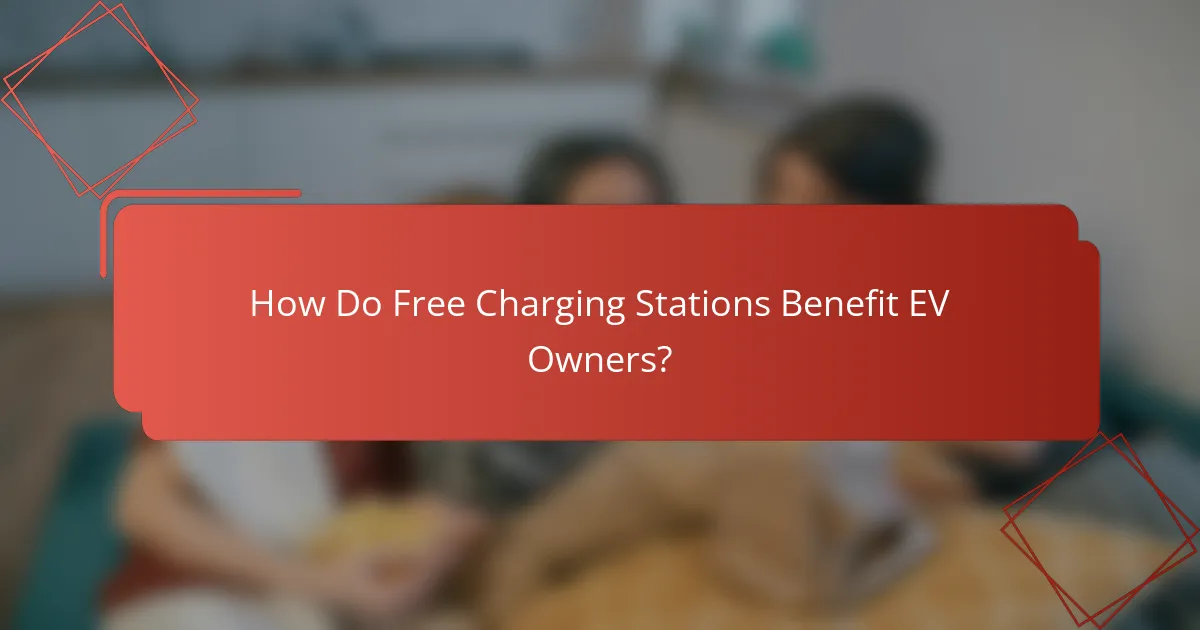
How Do Free Charging Stations Benefit EV Owners?
Free charging stations provide significant advantages for electric vehicle (EV) owners by reducing costs and enhancing convenience. These stations not only save money but also promote the broader adoption of electric vehicles.
Cost savings on charging
Utilizing free charging stations allows EV owners to significantly cut their electricity expenses. Instead of paying for every kilowatt-hour, drivers can recharge their vehicles without any direct costs, which can lead to savings of tens to hundreds of dollars annually, depending on usage.
Many public charging networks offer free stations, often funded by local governments or businesses aiming to encourage EV adoption. This financial benefit makes electric vehicles more appealing to potential buyers who are concerned about operating costs.
Increased accessibility
Free charging stations enhance accessibility for EV owners, especially in urban areas where charging infrastructure may be limited. With more free stations available, drivers can find convenient locations to charge their vehicles without worrying about fees.
These stations are often strategically placed in high-traffic areas, such as shopping centers and public parking lots, making it easier for EV owners to recharge while running errands or during work hours.
Support for EV adoption
Free charging stations play a crucial role in supporting the adoption of electric vehicles. By providing no-cost charging options, they alleviate concerns about range anxiety and the overall cost of ownership.
As more free charging stations become available, they encourage individuals to consider switching to electric vehicles, contributing to a cleaner environment and reduced dependence on fossil fuels.
Enhanced travel flexibility
Having access to free charging stations increases travel flexibility for EV owners. With more charging options available, drivers can plan longer trips without the fear of running out of battery power.
This flexibility allows for spontaneous travel and exploration, as EV owners can take advantage of free charging locations along their routes, making road trips more feasible and enjoyable.
Community engagement opportunities
Free charging stations often serve as community hubs, fostering engagement among EV owners and local residents. These stations can host events or informational sessions that promote electric vehicle awareness and sustainability practices.
By participating in community activities centered around these charging stations, EV owners can connect with like-minded individuals, share experiences, and advocate for further development of EV infrastructure in their areas.
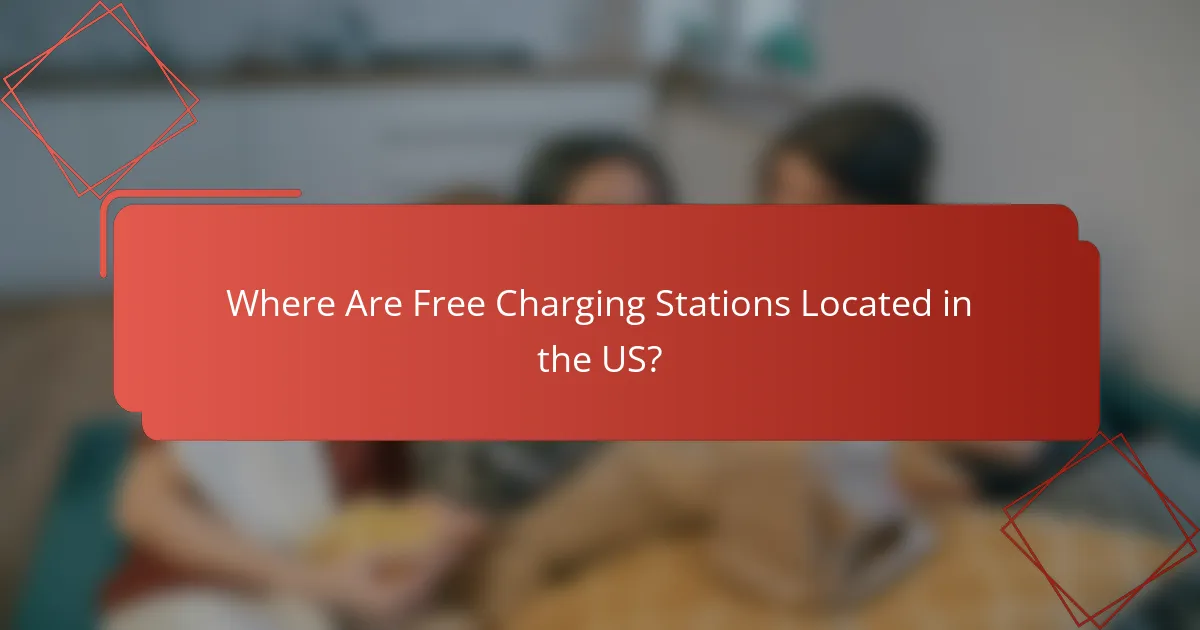
Where Are Free Charging Stations Located in the US?
Free charging stations for electric vehicles (EVs) can be found in various public and commercial locations across the United States. These stations provide an accessible way for EV owners to recharge their vehicles without incurring costs, often enhancing the overall driving experience.
Public parks and recreation areas
Many public parks and recreation areas offer free charging stations as part of their commitment to sustainability. These locations not only provide charging access but also encourage outdoor activities, allowing EV owners to enjoy nature while their vehicles recharge.
When visiting these parks, check for designated EV parking spots, which are typically marked and may have time limits for charging. Popular state and national parks often have these facilities, making them ideal for day trips or longer excursions.
Shopping centers and malls
Shopping centers and malls frequently install free charging stations to attract environmentally conscious consumers. These stations are usually located near entrances, allowing for convenient access while shopping.
It’s advisable to verify the availability of charging stations on the shopping center’s website or app before visiting. Some malls may require registration or an app to initiate charging, so be prepared with the necessary information.
Government buildings
Many government buildings, including municipal offices and libraries, provide free charging stations as part of their sustainability initiatives. These locations are often accessible to the public, promoting the use of electric vehicles among citizens.
Charging at government facilities may have specific hours of operation, so it’s wise to check in advance. Additionally, some locations might prioritize charging for government vehicles, so availability can vary.
Popular tourist attractions
Popular tourist attractions are increasingly offering free charging stations to accommodate visitors traveling in electric vehicles. These stations can be found at museums, landmarks, and entertainment venues, making it easier for tourists to explore without worrying about battery life.
Before visiting, look for information on charging station availability on the attraction’s website. Some places may have limited charging spots, so arriving early can help ensure access to a charging station during your visit.
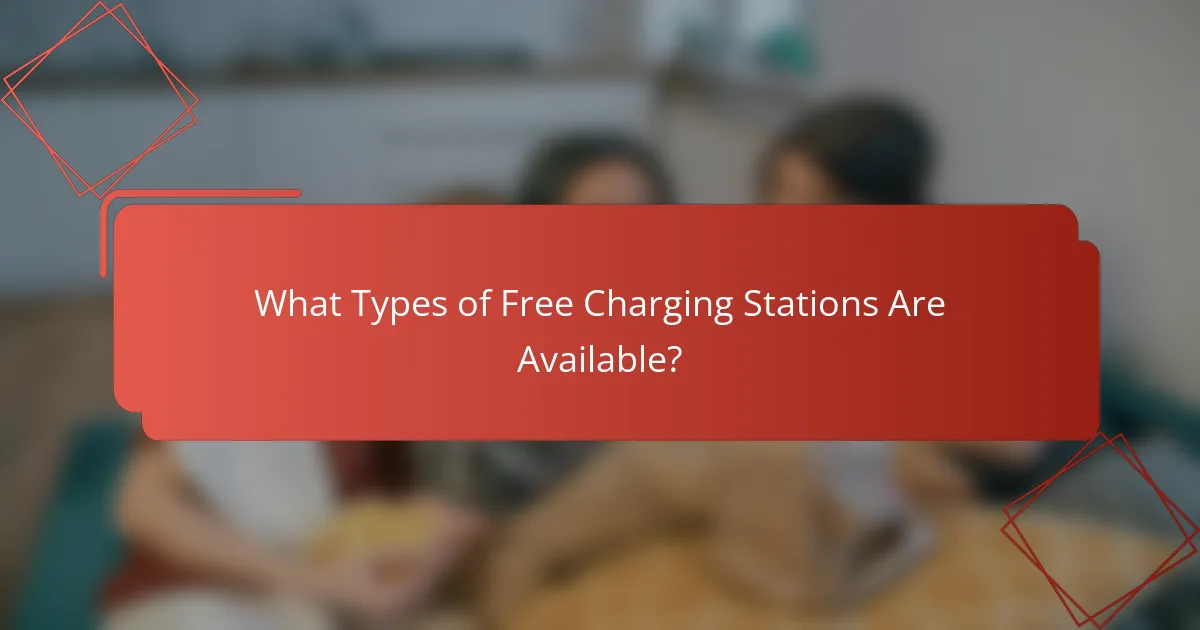
What Types of Free Charging Stations Are Available?
Free charging stations for electric vehicles (EVs) come in several types, each catering to different charging needs and speeds. Understanding these types can help EV owners choose the most suitable option for their charging requirements.
Level 2 charging stations
Level 2 charging stations are commonly found in public locations and residential areas, providing a charging speed of about 10 to 20 miles of range per hour. These stations typically operate on a 240-volt supply, making them ideal for longer stops, such as at shopping centers or workplaces.
When using Level 2 chargers, it’s important to check the availability of charging spots, as they can be limited during peak hours. Many municipalities and businesses offer these stations for free to encourage EV adoption, but some may require registration or a membership card.
DC fast charging stations
DC fast charging stations deliver a much quicker charge, adding approximately 60 to 100 miles of range in just 20 to 30 minutes. These stations utilize direct current to bypass the vehicle’s onboard charger, allowing for rapid energy transfer.
While many DC fast chargers are available for free, some may have usage fees or require a subscription. It’s advisable to locate these stations using apps that provide real-time availability and pricing information to avoid unexpected costs.
Solar-powered charging stations
Solar-powered charging stations harness energy from the sun to charge EVs, making them an eco-friendly option. These stations can vary in output, typically providing Level 2 charging speeds, and are often installed in locations with ample sunlight.
Using solar-powered chargers can be beneficial for both the environment and your wallet, as they often come with no cost for charging. However, their availability may be limited, so checking local resources or apps that track solar charging stations is recommended.
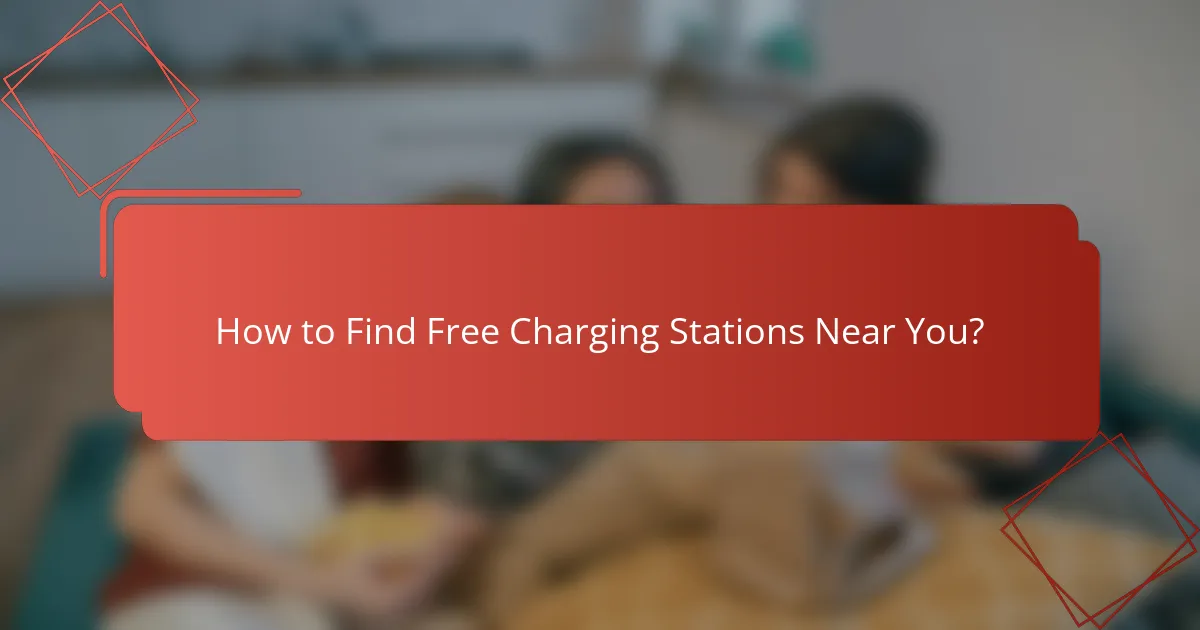
How to Find Free Charging Stations Near You?
Finding free charging stations for electric vehicles (EVs) is straightforward with the right tools. Utilize mobile apps, online maps, and local resources to locate charging points that won’t cost you anything.
Mobile apps like PlugShare
Mobile applications such as PlugShare are invaluable for locating free charging stations. These apps provide real-time information on charging locations, user reviews, and availability, making it easier to plan your route.
When using these apps, ensure your location services are enabled for the most accurate results. You can filter searches to show only free stations, helping you save on charging costs.
Online maps and directories
Online maps and directories, like Google Maps, can also help you find free charging stations. By searching for “free EV charging,” you can view nearby options along with user ratings and directions.
Consider bookmarking reliable directories that list charging stations by region. Some websites even provide details on the type of chargers available, which can be useful for specific EV models.
Local EV community resources
Local EV communities often share valuable information about free charging stations. Joining forums or social media groups can connect you with fellow EV owners who can recommend the best spots.
Participating in community events or meetups can also provide insights into newly established charging stations. Many local organizations maintain updated lists of free charging options, which can be a great resource for regular users.
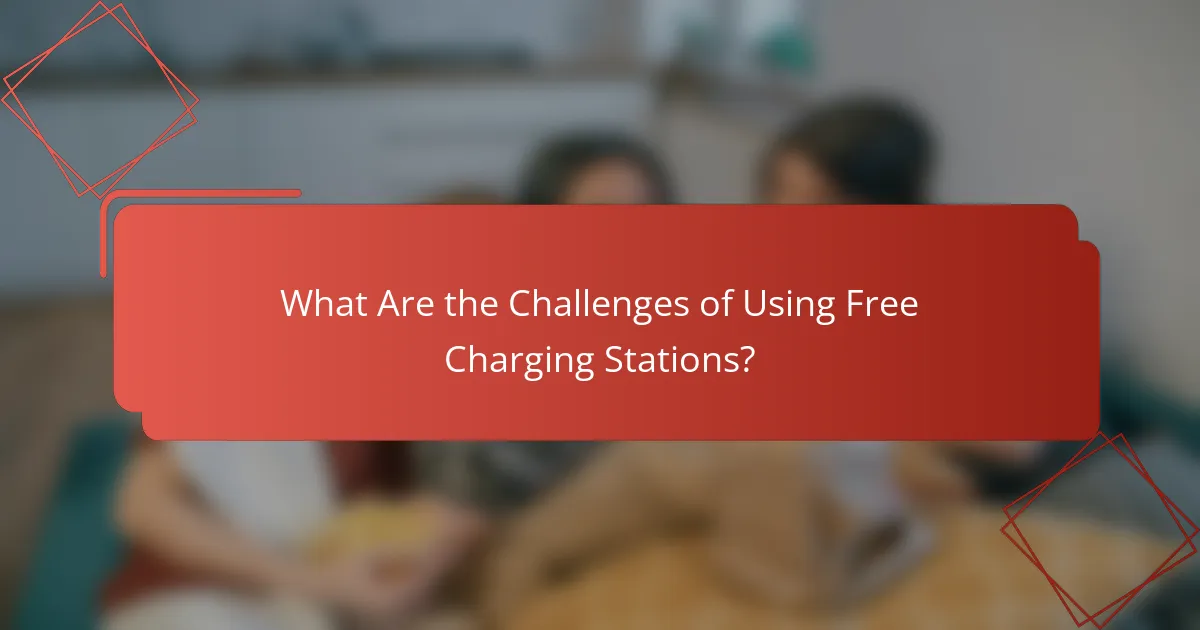
What Are the Challenges of Using Free Charging Stations?
Free charging stations can present several challenges for electric vehicle (EV) owners, including limited availability, competition for access, and varying charging speeds. Understanding these obstacles is crucial for optimizing the use of free charging options.
Availability and competition
Availability of free charging stations can be inconsistent, often depending on location and demand. In urban areas, the number of charging points may be limited, leading to competition among EV owners. This can result in longer wait times, especially during peak hours.
Some charging networks may have a higher concentration of free stations, while others might be sparse. It’s helpful to use apps or websites that track charging station locations and availability in real-time, allowing you to plan your charging stops effectively.
Additionally, consider the time of day when planning to use free charging stations. Off-peak hours, such as early mornings or late evenings, may offer less competition and greater availability.
